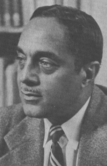12-02 marks the birthday of Charles Harris Wesley in 1891. He was an African-American historian, educator, and minister who was an early proponent of African-American studies.
Born in Louisville, Kentucky, Charles Wesley attended public schools in his hometown of Louisville, Kentucky and then went on to receive a B. A. at Fisk University in 1911, an M. A. in economics at Yale University in 1913, and a Ph.D. from Harvard University in 1925. Wesley’s doctorate in history was the third awarded by Harvard to an African-American. Wesley served on the Howard University faculty from 1913 to 1942.
In 1916, Wesley began a long association with Carter G. Woodson’s Association for the Study of Negro Life and History, serving as president from 1950 to 1965 and as executive director until 1972. In 1942, Wesley became president of Wilberforce University in Ohio, a school supported by the African Methodist Episcopal (AME). As president until 1965, Wesley improved the faculty, founded new programs (such as African Studies), and integrated the student body. Wesley served as director of the Afro-American Historical and Cultural Museum in Philadelphia from its opening in 1974 to 1976.
In addition to his work as an educator, Wesley was AME Church minister and elder from 1914 to 1937. Awarded a Guggenheim Fellowship in 1930, Wesley went to England to study slave emancipation in the British Empire. From 1931 to 1946, he was president of Alpha Phi Alpha, a Black fraternity about which he wrote in 1953. Wesley also wrote many other articles and books on African-American history, leaders and organizations, including Negro Labor in the United States, 1850-1925 (1927), Collapse of the Confederacy (1937) and his last book, The History of the National Association of Colored Women’s Clubs: A Legacy of Service (1984).
Charles Wesley died August 16, 1987, in Washington, D. C.
